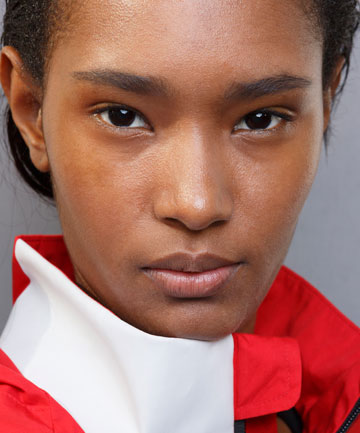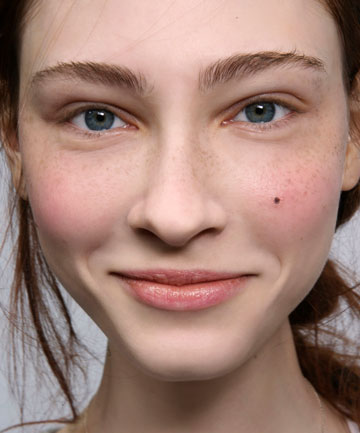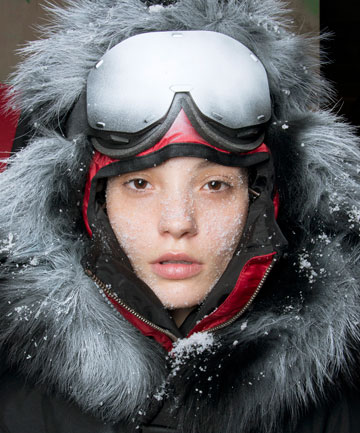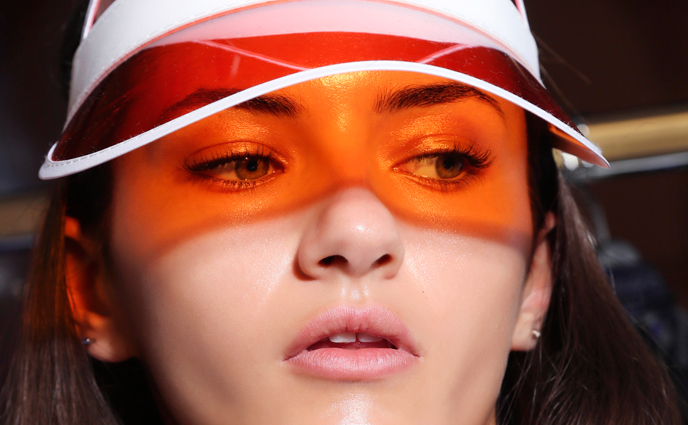You're pretty diligent with your sunscreen application during the summer months. After all, June-August, you've got beach trips, picnics and sunshine-filled vacations taking up all of your time. But just because it's not as hot and sunny the rest of the year, doesn't mean you should totally abandon your SPF habits.
In fact, sunscreen should be a staple in your skin care routine no matter what time of year it is. "Although most people know you should layer on sunscreen before hitting the beach in the summer, it is important to use it during every season," says Sonia Batra, MD, Santa Monica-based dermatologist and co-host of The Doctors. "In the colder, cloudier winter months, the sun's radiation can still be damaging even if you don't see its rays."
Here, learn more about why you should wear sunscreen even in the dead of winter. Plus, get easy tips from dermatologists for applying SPF year-round, even when you have limited time to spare.
Image via Imaxtree
To understand why slathering on SPF should be a step in your skin care routine 365 days a year, here's a quick science lesson on ultraviolet radiation: "The sun emits ultraviolet radiation, and those rays come down from the sun regardless of clouds or windows," explains Purvisha Patel, MD, dermatologist and Mohs surgeon in Memphis. "They go through any surface visible light can go through."
According to the American Academy of Dermatology (AAD), up to 80 percent of the sun's rays can penetrate your skin on cloudy days. "You may be at even higher risk [for sun damage] on partially overcast days because UV rays can bounce off of the edges of clouds, amplifying the harmful impacts," says Batra. "The same reflective effect for UV occurs off of snow, ice, bodies of water, sandy beaches or even concrete."
There are two types of UV rays you have to worry about: UVA and UVB. "Although UVA generally doesn't cause the bright red sunburn that we've all come to associate with sun damage, it does cause wrinkling, color and textural changes in the skin and, most importantly, skin cancer," says Papri Sarkar, MD, dermatologist in Brookline, Massachusetts. "UVB, which causes sunburn, also causes skin cancer—so really you have to make sure that you're protecting yourself all year long."
Image via Imaxtree
Most dermatologists, as well as the AAD and the Skin Cancer Foundation, recommend using a broad-spectrum sunscreen with an SPF of 30 or higher every day on exposed areas. (Sarkar advises patients who are at high risk or have a history of skin cancer to use an SPF of 50.)
SPF stands for sun protection factor. It's a measure of how long a sunscreen will keep your skin protected from UVB rays. Let's say you usually burn in 10 minutes: That means an SPF 30 will protect you for 30 times longer. So that's about 300 minutes, or five hours. But because you're probably moving around and sweating throughout the day, experts recommend reapplying every two hours.
Because SPF only shields against UVB rays, it's important to use a sunscreen that's broad-spectrum, because that means it offers UVA protection as well. Think of broad-spectrum sunscreen as the ultimate anti-aging tool in your arsenal. "Sunscreen has earned its place as the most effective anti-aging product because it's always easier to prevent signs of aging than to treat them," says Joel Schlessinger, MD, dermatologist and RealSelf contributor.
Image via Imaxtree
As for how much you should apply, Michael Swann, MD, dermatologist in Springfield, Missouri, points out that most people don't apply nearly enough sunscreen to provide the SPF protection on the label, so more is always better. "Studies show people put about one-third of the sunscreen necessary to give them the protection listed on the label (SPF 45), which results in them getting much less protection than they expect they should get," he says.
In the summer, you usually need about a shot glass worth of sunscreen per side of your body, says Patel. "In the cooler months with more clothing on for more protection, it is important to apply a quarter size amount to your face, hands and any other sun-exposed areas," she says. Since so many people don't apply enough sunscreen, Sarkar usually recommends applying one layer and then a second layer.
And yes, you should still apply sunscreen even if you spend the majority of your time indoors. "With respect to windows, glass only filters shorter wavelength UVB rays," says Batra. "However, UVA rays, which have a longer wavelength and penetrate more deeply, can still pass through glass." That's why Batra says people who spend a lot of time in the car often have more signs of sun damage on the skin on their window side. Patel adds that sunscreen will also help protect your skin from damaging blue light radiation from computers and devices.
Image via Imaxtree
Are you a snow bunny come wintertime? You need to pay extra attention to sun care while skiing or snowboarding. "Winter sports like skiing and snowboarding combine the dry air of high altitudes with intense sun exposure," says Schlessinger. "Dry, compromised skin is even more susceptible to sun damage, which means it's even more important for these athletes to use an effective sunscreen." Look for a high-SPF, broad-spectrum, water-resistant sunscreen, suggests Schlessinger, and don't overlook your lips. "The lips are easily forgotten when it comes to sunscreen application, but with the dry winter air, you'll also want a lip balm that offers sun protection," says Schlessinger.
Image via Imaxtree









